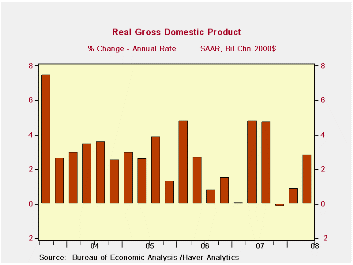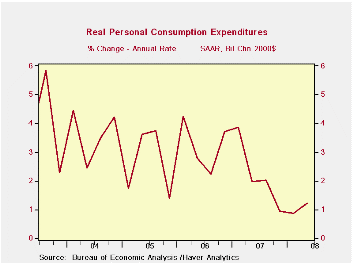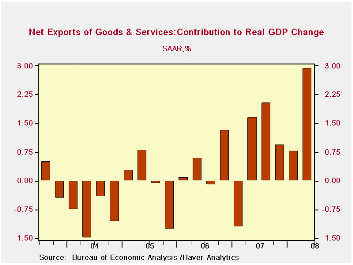 Global| Sep 26 2008
Global| Sep 26 2008U.S. 2Q'08 GDP Growth Lowered Slightly
by:Tom Moeller
|in:Economy in Brief
Summary
Second quarter '08 U.S. real GDP growth was revised down slightly to 2.8% from the preliminary estimate of 3.3% growth. Despite the revision, last quarter's growth was the quickest since the third quarter of last year but it fell [...]

Second quarter '08 U.S. real GDP growth was revised down slightly to 2.8% from the preliminary estimate of 3.3% growth. Despite the revision, last quarter's growth was the quickest since the third quarter of last year but it fell short of Consensus expectations for no revision to the earlier estimate.
A reduced estimate of growth in final sales to domestic purchasers was the source of the revision. It was taken down to a 1.3% rate of increase. The increase followed two quarters of no change in the level of domestic demand.Real personal consumption grew a bit slower than estimated earlier, at 1.2% (1.3% y/y). The tax rebate checks presumably helped growth improve from the 0.9% figure averaged during the prior two quarters, but it seems to have been slight. Spending on autos & light trucks fell at a 19.7% (-9.8% y/y) annual rate while spending on furniture & other household equipment jumped at a 14.0% (7.0% y/y) rate. Spending on apparel surged at a 10.9% (3.6% y/y) rate. Growth in real PCE added 0.9 percentage points to 2Q real GDP growth after a 0.6 point add during 1Q. The 2Q addition was revised down from a 1.2% addition mostly due to a lowered figure for growth in services spending to 0.7% (1.7% y/y).
Growth in business fixed investment was held roughly steady at 2.5% (4.2% y/y). These latest rates of growth are down sharply from 4.9% increases last year and growth above 7.0% during 2006 and 2005. Last quarter, equipment investment fell at a downwardly revised 5.0% (-0.3% y/y) rate while structures investment jumped at an upwardly revised 18.4% (13.9% y/y) rate.
Growth in corporate profits was revised lower to -14.3% (AR, -8.3% y/y). Profitability in the financial sector was reduced sharply to a 27.1% (-20.4% y/y) rate of decline which compared to an estimated 26.5% rate of advance estimated earlier. Conversely, the decline in domestic nonfinancial profitability was lessened to -2.1% (-12.6% y/y) but it was still the sixth drop in profits in the last seven quarters. Foreign sector profits fell at a deeper 22.8% rate (23.3% y/y). An improved foreign trade deficit added a little-revised 2.9 percentage points to GDP growth. That was the largest addition since the third quarter of 1980. Exports grew at a 12.3% annual rate (11.0% y/y) while growth in imports fell about as estimated earlier at a 7.3% (-1.9% y/y) rate. That was the steepest quarterly rate of decline since the recession year of 2001.
Inventory decumulation reduced 2Q GDP growth by a little changed 1.5 percentage points, still the largest subtraction in three years.
The GDP chain price index was little revised and grew at a 1.1% rate. The small increase was due to a 3.5% (-1.5% y/y) rate of decline in residential investment prices. That was the fourth decline in the last five quarters. The PCE price index grew at an unrevised, accelerated 4.3% (3.7% y/y) rate. Capital spending prices rose at an accelerated 2.3% rate (1.0% y/y).
| Chained 2000$, % AR | 2Q '08 (Final) | 2Q '08 (Preliminary) | 2Q '08 (Advance) | 1Q '08 | 2Q Y/Y | 2007 | 2006 | 2005 |
|---|---|---|---|---|---|---|---|---|
| GDP | 2.8 | 3.3 | 1.9 | 0.9 | 2.1 | 2.0 | 2.8 | 2.9 |
| Inventory Effect | -1.4 | -1.4 | -1.9 | -0.0 | -0.4 | -0.4 | 0.0 | -0.2 |
| Final Sales | 4.4 | 4.8 | 3.9 | 0.9 | 2.5 | 2.4 | 2.8 | 3.1 |
| Foreign Trade Effect | 2.9 | 3.1 | 2.4 | 0.8 | 1.7 | 0.6 | 0.2 | 0.0 |
| Domestic Final Demand | 1.3 | 1.5 | 1.3 | 0.1 | 0.8 | 1.8 | 2.6 | 3.1 |
| Chained GDP Price Index | 1.1 | 1.2 | 1.1 | 2.6 | 2.0 | 2.7 | 3.2 | 3.3 |
Tom Moeller
AuthorMore in Author Profile »Prior to joining Haver Analytics in 2000, Mr. Moeller worked as the Economist at Chancellor Capital Management from 1985 to 1999. There, he developed comprehensive economic forecasts and interpreted economic data for equity and fixed income portfolio managers. Also at Chancellor, Mr. Moeller worked as an equity analyst and was responsible for researching and rating companies in the economically sensitive automobile and housing industries for investment in Chancellor’s equity portfolio. Prior to joining Chancellor, Mr. Moeller was an Economist at Citibank from 1979 to 1984. He also analyzed pricing behavior in the metals industry for the Council on Wage and Price Stability in Washington, D.C. In 1999, Mr. Moeller received the award for most accurate forecast from the Forecasters' Club of New York. From 1990 to 1992 he was President of the New York Association for Business Economists. Mr. Moeller earned an M.B.A. in Finance from Fordham University, where he graduated in 1987. He holds a Bachelor of Arts in Economics from George Washington University.
More Economy in Brief
 Global| Feb 05 2026
Global| Feb 05 2026Charts of the Week: Balanced Policy, Resilient Data and AI Narratives
by:Andrew Cates






